RefugePoint
Rebecca*
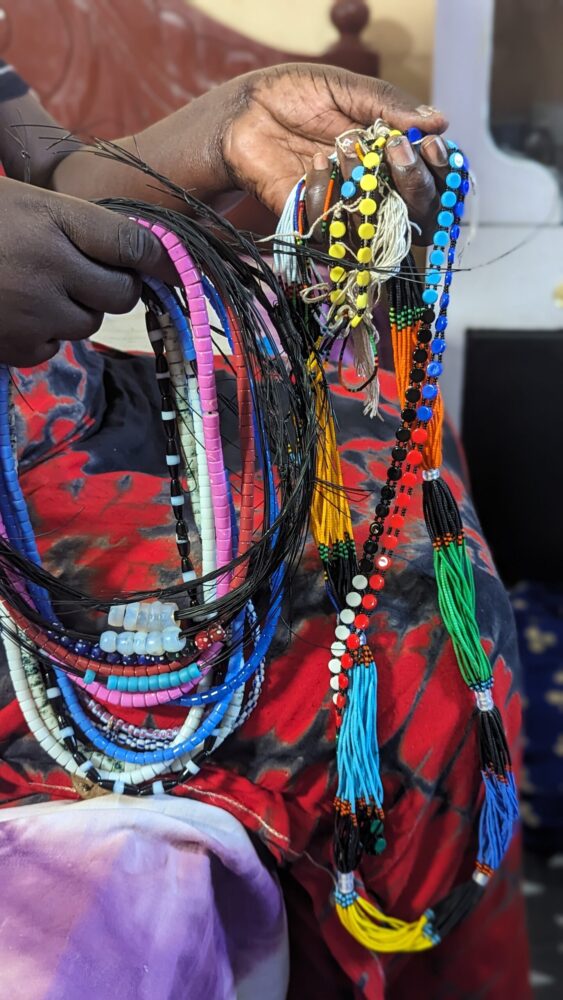
In 2011, Rebecca, a refugee from Ethiopia, fled her home due to insecurity and violence. Rebecca initially sought safety at the Dadaab refugee camp in Kenya and later moved to Nairobi in search of a better life. By the time she arrived in Kenya, she was not alone: Rebecca’s sister had passed away, leaving behind two daughters, who Rebecca decided to raise as her own.
“When I got to Kenya, life was hard, especially in a new place. I did not have enough to eat,” Rebecca shared when we visited her home. “I started a business, selling injera (an Ethiopian flatbread) and coffee and also sold some beaded wares and fabrics.” While Rebecca’s income allowed her to afford some basic needs, she was not earning enough profit to sustain her family. “It took a lot of work to maintain my business,” Rebecca said. “I would struggle to make ends meet with that small business.”
In November 2022, Rebecca began receiving rent assistance, food support, and counseling services through RefugePoint. After reaching a point of stability, Rebecca completed RefugePoint’s business development training, where she learned the skills needed to run and maintain a profitable business. After the training, Rebecca received a grant of $500 to boost her small business and expand her stock.
Not long after receiving the grant, the demand for Rebecca’s products grew. She also found a way to export her crafts and fabrics to Australia, with the aim of increasing her profit margins. “One of the clients I export my products to used to live here,” Rebecca shared. “I sent the items to her, and she sent me $400, which was a lot. I used it to buy new deras (a large dress that comes in one size), which I went to sell in Kakuma. I used the rest for [house] rent,” Rebecca shared.
Since the expansion of her business, Rebecca has been able to support her family. “Life is good. I used to eat one meal daily, but now we can eat two meals,” Rebecca shared. “I can even take my children to school and pay rent.”

In 2011, Rebecca, a refugee from Ethiopia, fled her home due to insecurity and violence. Rebecca initially sought safety at the Dadaab refugee camp in Kenya and later moved to Nairobi in search of a better life. By the time she arrived in Kenya, she was not alone: Rebecca’s sister had passed away, leaving behind two daughters, who Rebecca decided to raise as her own.
“When I got to Kenya, life was hard, especially in a new place. I did not have enough to eat,” Rebecca shared when we visited her home. “I started a business, selling injera (an Ethiopian flatbread) and coffee and also sold some beaded wares and fabrics.” While Rebecca’s income allowed her to afford some basic needs, she was not earning enough profit to sustain her family. “It took a lot of work to maintain my business,” Rebecca said. “I would struggle to make ends meet with that small business.”
In November 2022, Rebecca began receiving rent assistance, food support, and counseling services through RefugePoint. After reaching a point of stability, Rebecca completed RefugePoint’s business development training, where she learned the skills needed to run and maintain a profitable business. After the training, Rebecca received a grant of $500 to boost her small business and expand her stock.
Not long after receiving the grant, the demand for Rebecca’s products grew. She also found a way to export her crafts and fabrics to Australia, with the aim of increasing her profit margins. “One of the clients I export my products to used to live here,” Rebecca shared. “I sent the items to her, and she sent me $400, which was a lot. I used it to buy new deras (a large dress that comes in one size), which I went to sell in Kakuma. I used the rest for [house] rent,” Rebecca shared.
Since the expansion of her business, Rebecca has been able to support her family. “Life is good. I used to eat one meal daily, but now we can eat two meals,” Rebecca shared. “I can even take my children to school and pay rent.”
Win-win scenario: qualified refugees help employers fill gaps in the labor market with labor mobility
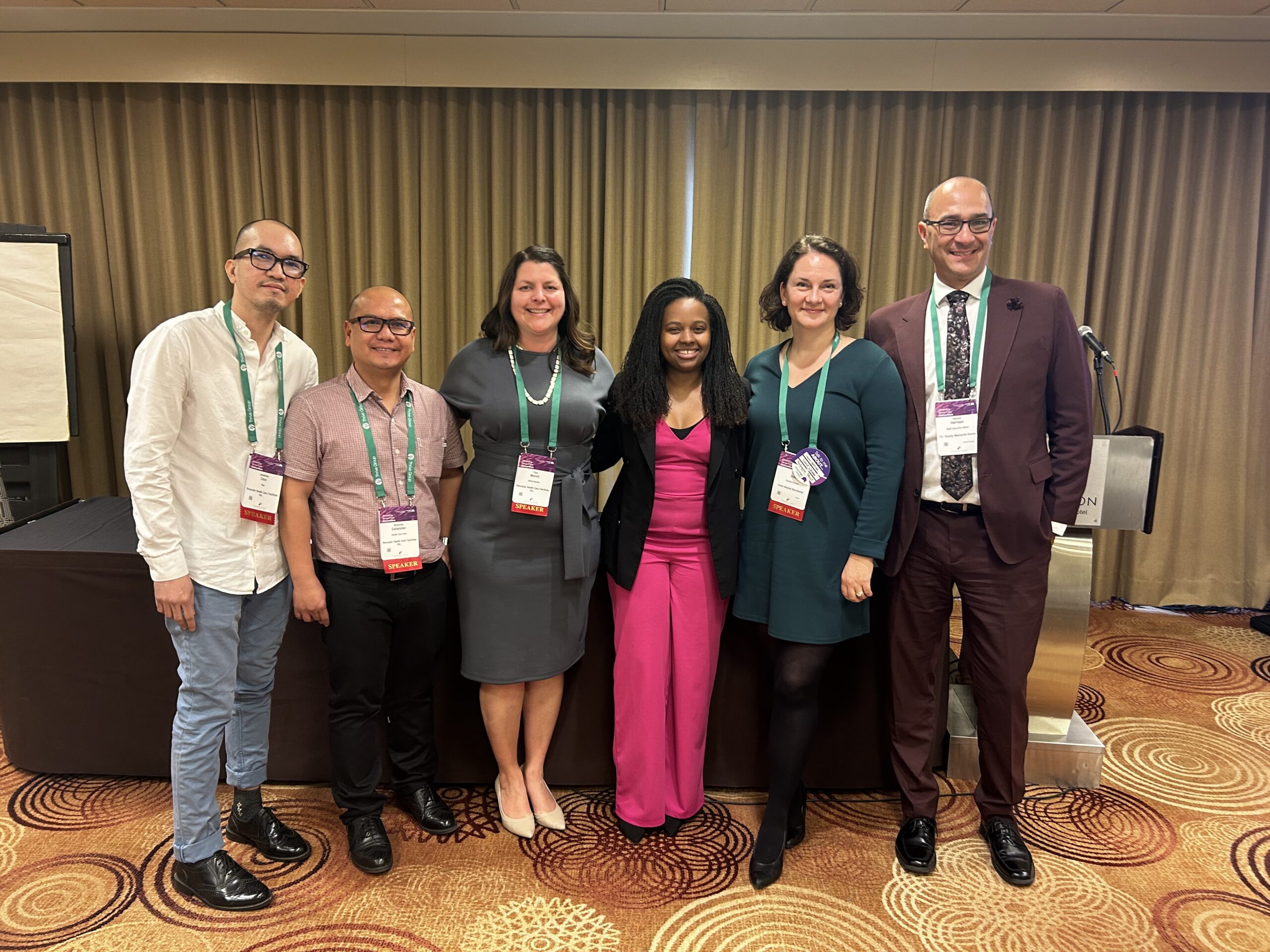
Canada’s Economic Mobility Pathways Pilot (EMPP), a labor mobility program for refugees, matches qualified refugees looking to rebuild their lives with employers looking to fill gaps in the labor market. This concept has been particularly successful in Canada’s long-term care sector. As part of the EMPP, hundreds of jobs have been filled, and hundreds of refugees and their families have found new homes after sometimes decades of waiting.
Bahati Maganjo, one of the first refugee candidates to relocate to Canada as part of the EMPP in 2021 and now Labor Mobility Advisor at RefugePoint, spoke on a panel last month at AdvantAge Ontario’s annual conference. The session, “Immigration Pathways to Build LTC (long term care) Workforce,” highlighted how two long-term care homes in rural Ontario looked outside of the province to meet their labor needs. Panelists discussed the benefits of and differences between the EMPP and the Temporary Foreign Worker Program (TFWP) and how Canadian long term care homes have successfully used both programs to address significant staffing shortages.

Canada’s Economic Mobility Pathways Pilot (EMPP), a labor mobility program for refugees, matches qualified refugees looking to rebuild their lives with employers looking to fill gaps in the labor market. This concept has been particularly successful in Canada’s long-term care sector. As part of the EMPP, hundreds of jobs have been filled, and hundreds of refugees and their families have found new homes after sometimes decades of waiting.
Bahati Maganjo, one of the first refugee candidates to relocate to Canada as part of the EMPP in 2021 and now Labor Mobility Advisor at RefugePoint, spoke on a panel last month at AdvantAge Ontario’s annual conference. The session, “Immigration Pathways to Build LTC (long term care) Workforce,” highlighted how two long-term care homes in rural Ontario looked outside of the province to meet their labor needs. Panelists discussed the benefits of and differences between the EMPP and the Temporary Foreign Worker Program (TFWP) and how Canadian long term care homes have successfully used both programs to address significant staffing shortages.
Refugees Are an Asset, Not a Burden: Sasha Chanoff on System Catalysts
This month, Sasha Chanoff, CEO and Founder of RefugePoint, appeared as a guest on an episode of System Catalysts podcast.
In a dynamic conversation with Jeffrey Walker, philanthropist and co-host, Chanoff shared RefugePoint’s mission of providing refugees access to life-saving solutions and its unique systems change approach to combating the refugee crisis.
Chanoff’s dedication to empowering displaced communities resonated deeply throughout the conversation. Highlights of the episode include Chanoff’s origin story, the work RefugePoint and its collaborators have done in the past two decades, how to create sustainable systems change, and the belief that refugees are an asset–not a burden.
“If we can find ways to tap into people’s intrinsic strengths and enable them to support themselves and the countries to which they fled, that is part of the solution,” he said.
Please find Sasha Chanoff’s insightful and passionate episode on System Catalysts wherever you listen to podcasts.
System Catalysts, produced by Webby-winning Hueman Group Media, shares stories from activists, philanthropists, and change-makers who put their egos aside to improve the systems that run the world.
This month, Sasha Chanoff, CEO and Founder of RefugePoint, appeared as a guest on an episode of System Catalysts podcast.
In a dynamic conversation with Jeffrey Walker, philanthropist and co-host, Chanoff shared RefugePoint’s mission of providing refugees access to life-saving solutions and its unique systems change approach to combating the refugee crisis.
Chanoff’s dedication to empowering displaced communities resonated deeply throughout the conversation. Highlights of the episode include Chanoff’s origin story, the work RefugePoint and its collaborators have done in the past two decades, how to create sustainable systems change, and the belief that refugees are an asset–not a burden.
“If we can find ways to tap into people’s intrinsic strengths and enable them to support themselves and the countries to which they fled, that is part of the solution,” he said.
Please find Sasha Chanoff’s insightful and passionate episode on System Catalysts wherever you listen to podcasts.
System Catalysts, produced by Webby-winning Hueman Group Media, shares stories from activists, philanthropists, and change-makers who put their egos aside to improve the systems that run the world.
Daudi
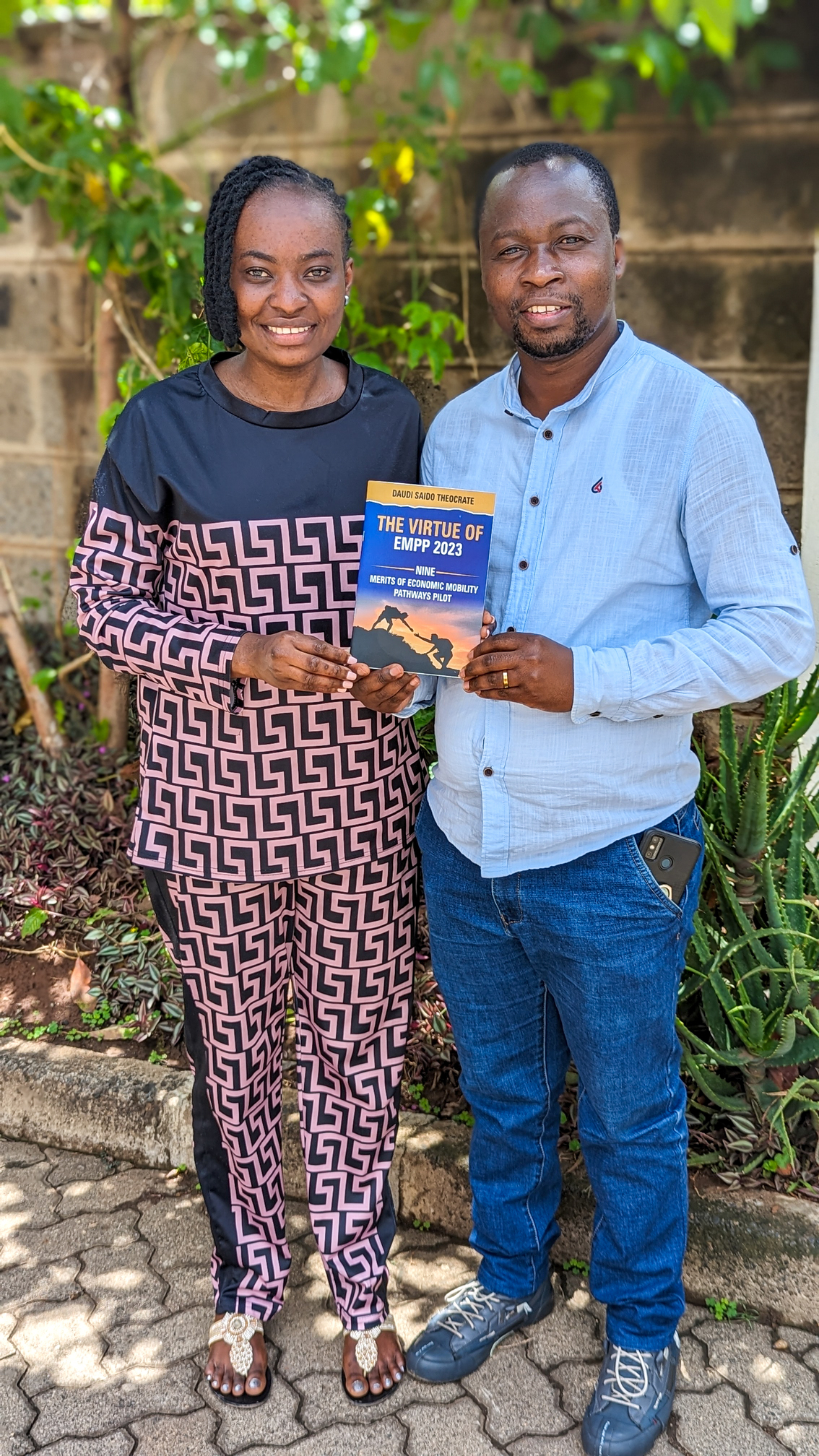
From an early age, Daudi discovered his calling to serve others while caring for his elderly grandmother in the Democratic Republic of Congo. This passion blossomed into a commitment to aid those with medical needs, leading him to pursue higher education in public health. Daudi set himself up for a promising career after graduating in 2012 from the Advanced Institute of Medical Techniques (ISTM) with degrees in Public Health and Nursing Science.
However, in 2014, a week before he was to report to his first job as a Hospital Manager, rebels attacked Daudi’s village in Uvira, South Kivu. He had to flee for his life and abruptly left behind his parents and siblings. Daudi escaped torture and persecution during his flight and arrived in Nairobi in October 2014. A local pastor in Nairobi offered him shelter and basic needs, and he later registered with UNHCR as an asylum seeker.
Despite facing numerous challenges in Nairobi, such as insecurity and limited resources, Daudi found solace and support through counseling provided by the Center for Victims of Torture (CVT), a non-governmental organization working with refugees. He learned how to overcome challenges, cope with new situations, and find rational ways to manage day-to-day stress in life.
While living in Nairobi, Daudi began working as a nurse for Sudi Medical Clinic, Mercy Mission Medical Center, and Medben Health Services. Due to restrictions on refugee employment in Kenya, he could only secure temporary positions with low wages. Undeterred, he continued to pursue educational opportunities, including training in emergency maternal care and infectious diseases.
In 2018, one of his CVT counselors told him about the Economic Mobility Pathway Pilot (EMPP), a Canadian pathway that helps skilled refugees immigrate to Canada through existing economic programs. Canada’s Economic Mobility Project connects refugees to job opportunities that allow them to relocate to a safe, new country. RefugePoint partners with the Government of Canada, UNHCR, and Talent Beyond Boundaries to help qualified refugees living in Kenya to immigrate to Canada through work-based visas.
Daudi remembers receiving an email from one of his CVT counselors with the Call for Application from RefugePoint. He submitted his application and was called for the first interview with a potential employer shortly after. Unfortunately, he was unsuccessful because of challenges with English fluency. This only made him more determined in his career. RefugePoint supported Daudi in taking the IELTS test and practicing language skills during the interview. He also studied English with a local teacher. When the next round of interviews came around in 2020, he was prepared to present himself to potential employers.
On November 15, 2021, Daudi received a job offer to join MacLeod Cares, a trusted name in retirement living and senior care in Nova Scotia, Canada. “I am very happy that this program is a hope for us refugees. It is a hope for us refugees to go and start working in Canada. It is an opportunity to have what we call a self-reliant life,” Daudi shared during a visit to RefugePoint’s Nairobi office.
Inspired by his journey, Daudi authored a book titled “The Virtue of EMPP 2023: Nine Merits of Economic Mobility Pathway Pilot,” detailing his experiences and the transformative impact of the program. Daudi and his wife, Junitha, both refugees from the DRC, eagerly anticipate building a new life in Canada, confident in their ability to integrate, pursue further education, and contribute to their new community and the global economy.
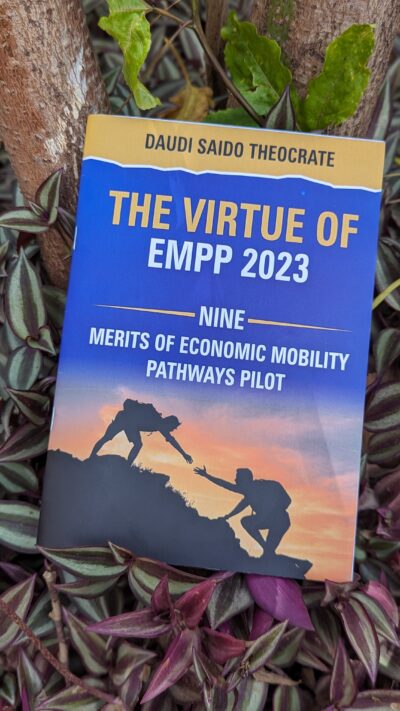
[Refugees are not a homogenous group, and come from a wide range of backgrounds, so taking on refugee interns or staff can hugely increase the diversity of your business. Drawing from this wide range of candidates from all over the world can greatly help diversify thinking and skill sets within your business, leading to vastly improved innovation and growth.] excerpt from Daudi’s book, The Virtue of EMPP 2023: Nine Merits of Economic Mobility Pathway Pilot, Pg. 14.

From an early age, Daudi discovered his calling to serve others while caring for his elderly grandmother in the Democratic Republic of Congo. This passion blossomed into a commitment to aid those with medical needs, leading him to pursue higher education in public health. Daudi set himself up for a promising career after graduating in 2012 from the Advanced Institute of Medical Techniques (ISTM) with degrees in Public Health and Nursing Science.
However, in 2014, a week before he was to report to his first job as a Hospital Manager, rebels attacked Daudi’s village in Uvira, South Kivu. He had to flee for his life and abruptly left behind his parents and siblings. Daudi escaped torture and persecution during his flight and arrived in Nairobi in October 2014. A local pastor in Nairobi offered him shelter and basic needs, and he later registered with UNHCR as an asylum seeker.
Despite facing numerous challenges in Nairobi, such as insecurity and limited resources, Daudi found solace and support through counseling provided by the Center for Victims of Torture (CVT), a non-governmental organization working with refugees. He learned how to overcome challenges, cope with new situations, and find rational ways to manage day-to-day stress in life.
While living in Nairobi, Daudi began working as a nurse for Sudi Medical Clinic, Mercy Mission Medical Center, and Medben Health Services. Due to restrictions on refugee employment in Kenya, he could only secure temporary positions with low wages. Undeterred, he continued to pursue educational opportunities, including training in emergency maternal care and infectious diseases.
In 2018, one of his CVT counselors told him about the Economic Mobility Pathway Pilot (EMPP), a Canadian pathway that helps skilled refugees immigrate to Canada through existing economic programs. Canada’s Economic Mobility Project connects refugees to job opportunities that allow them to relocate to a safe, new country. RefugePoint partners with the Government of Canada, UNHCR, and Talent Beyond Boundaries to help qualified refugees living in Kenya to immigrate to Canada through work-based visas.
Daudi remembers receiving an email from one of his CVT counselors with the Call for Application from RefugePoint. He submitted his application and was called for the first interview with a potential employer shortly after. Unfortunately, he was unsuccessful because of challenges with English fluency. This only made him more determined in his career. RefugePoint supported Daudi in taking the IELTS test and practicing language skills during the interview. He also studied English with a local teacher. When the next round of interviews came around in 2020, he was prepared to present himself to potential employers.
On November 15, 2021, Daudi received a job offer to join MacLeod Cares, a trusted name in retirement living and senior care in Nova Scotia, Canada. “I am very happy that this program is a hope for us refugees. It is a hope for us refugees to go and start working in Canada. It is an opportunity to have what we call a self-reliant life,” Daudi shared during a visit to RefugePoint’s Nairobi office.
Inspired by his journey, Daudi authored a book titled “The Virtue of EMPP 2023: Nine Merits of Economic Mobility Pathway Pilot,” detailing his experiences and the transformative impact of the program. Daudi and his wife, Junitha, both refugees from the DRC, eagerly anticipate building a new life in Canada, confident in their ability to integrate, pursue further education, and contribute to their new community and the global economy.

[Refugees are not a homogenous group, and come from a wide range of backgrounds, so taking on refugee interns or staff can hugely increase the diversity of your business. Drawing from this wide range of candidates from all over the world can greatly help diversify thinking and skill sets within your business, leading to vastly improved innovation and growth.] excerpt from Daudi’s book, The Virtue of EMPP 2023: Nine Merits of Economic Mobility Pathway Pilot, Pg. 14.
Acha*
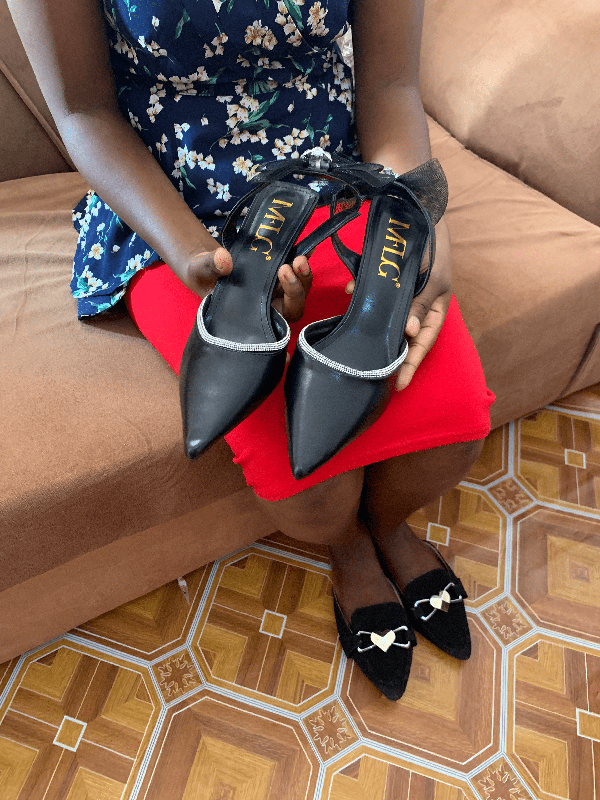
Acha*, a refugee living in Nairobi, Kenya, has built a successful fashion enterprise by leveraging social media platforms to sell clothes both locally and internationally.
Acha
In 2016, Acha and her sisters were forced to flee their home due to political violence in their country. After arriving in Nairobi, Kenya as refugees, Acha and her family struggled to survive. In 2021, RefugePoint staff identified Acha as someone who could benefit from our program, and Acha began working in partnership with RefugePoint to reach a point of self-reliance. As a URPP client, Acha completed the Business Development Skills (BDS) training and received a grant to start her own business. Through her business selling clothes and shoes in several Nairobi neighborhoods, Acha has reached a point of stability in her life.
“Ever since I was a little girl, I have loved fashion a lot. There is a TV show that I used to love to watch about someone who was in love with fashion. In the show, the character’s parents supported her to be able to venture into that business, so that is how my passion grew. When the opportunity came to start a business, it was a no-brainer. I did not have to think twice about the type of business I would start. I went straight into fashion.”
Acha delivers clothing orders throughout the city of Nairobi, either in person or through trusted motorbike riders and couriers. Over time, Acha has learned to leverage the power of social media to market her products. She advertises on Facebook Marketplace and WhatsApp, and receives referrals to potential customers daily. Recently, she started selling her products internationally on several online platforms including Facebook, Instagram, and WhatsApp marketing.
“For those who are in business, I would advise them to consider taking the business online because it is really convenient and I am able to control everything from my phone. It is less hectic because I don’t necessarily need to physically move around,” Acha shared with us.
In 2024, Acha began working as a mentor at RefugePoint’s BDS training sessions—the very sessions that she once attended—to help other refugees start their own businesses. Acha’s business and mentoring activities demonstrate her innovative and entrepreneurial spirit and commitment to growing her business through creative marketing strategies.

Acha*, a refugee living in Nairobi, Kenya, has built a successful fashion enterprise by leveraging social media platforms to sell clothes both locally and internationally.
Acha
In 2016, Acha and her sisters were forced to flee their home due to political violence in their country. After arriving in Nairobi, Kenya as refugees, Acha and her family struggled to survive. In 2021, RefugePoint staff identified Acha as someone who could benefit from our program, and Acha began working in partnership with RefugePoint to reach a point of self-reliance. As a URPP client, Acha completed the Business Development Skills (BDS) training and received a grant to start her own business. Through her business selling clothes and shoes in several Nairobi neighborhoods, Acha has reached a point of stability in her life.
“Ever since I was a little girl, I have loved fashion a lot. There is a TV show that I used to love to watch about someone who was in love with fashion. In the show, the character’s parents supported her to be able to venture into that business, so that is how my passion grew. When the opportunity came to start a business, it was a no-brainer. I did not have to think twice about the type of business I would start. I went straight into fashion.”
Acha delivers clothing orders throughout the city of Nairobi, either in person or through trusted motorbike riders and couriers. Over time, Acha has learned to leverage the power of social media to market her products. She advertises on Facebook Marketplace and WhatsApp, and receives referrals to potential customers daily. Recently, she started selling her products internationally on several online platforms including Facebook, Instagram, and WhatsApp marketing.
“For those who are in business, I would advise them to consider taking the business online because it is really convenient and I am able to control everything from my phone. It is less hectic because I don’t necessarily need to physically move around,” Acha shared with us.
In 2024, Acha began working as a mentor at RefugePoint’s BDS training sessions—the very sessions that she once attended—to help other refugees start their own businesses. Acha’s business and mentoring activities demonstrate her innovative and entrepreneurial spirit and commitment to growing her business through creative marketing strategies.
Innocent*
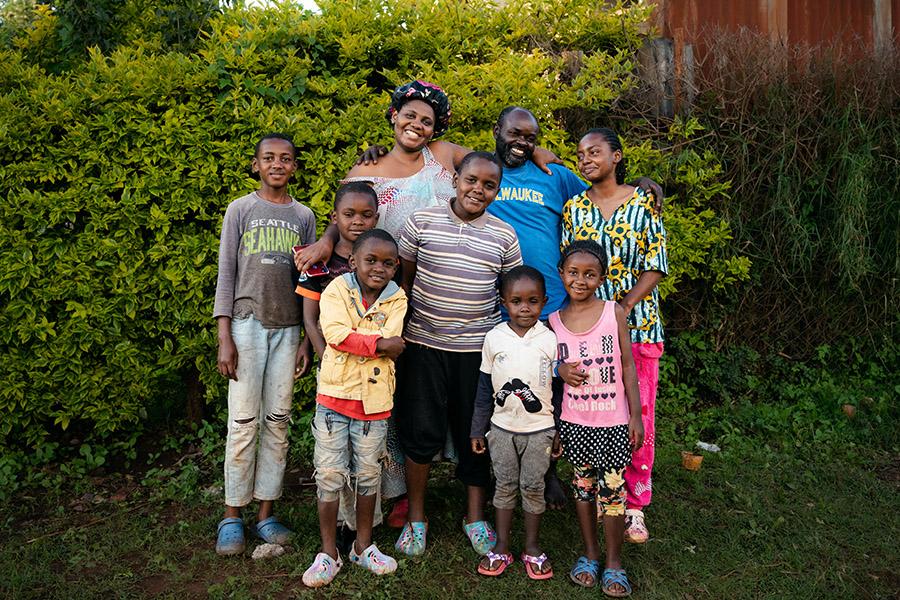
Innocent* and his wife Lydia live in Nairobi, Kenya with their eight children (they recently welcomed a new baby in November 2023, after this photo was taken!). Innocent was forced to flee his home due to insecurity.
With help from RefugePoint, all school-age children are attending school, which allows both parents time to work and earn an income to meet the family’s needs. Innocent works as a security guard and an English translator, and his wife works as a church pastor. The family graduated to self-reliance in 2022, meaning they are able to meet their own basic needs.
Looking to the future, family unity is of the utmost importance to Innocent. He says, “I encourage them [my children] to work together, to be one unit. When we are united, no one can destroy us.”
*Name changed for protection

Innocent* and his wife Lydia live in Nairobi, Kenya with their eight children (they recently welcomed a new baby in November 2023, after this photo was taken!). Innocent was forced to flee his home due to insecurity.
With help from RefugePoint, all school-age children are attending school, which allows both parents time to work and earn an income to meet the family’s needs. Innocent works as a security guard and an English translator, and his wife works as a church pastor. The family graduated to self-reliance in 2022, meaning they are able to meet their own basic needs.
Looking to the future, family unity is of the utmost importance to Innocent. He says, “I encourage them [my children] to work together, to be one unit. When we are united, no one can destroy us.”
*Name changed for protection
Transforming the migration system to make it work for displaced talent
Tens of billions of dollars are spent each year sheltering displaced people, while million of jobs go unfilled across developed economies.
Tens of billions of dollars are spent each year sheltering displaced people, while million of jobs go unfilled across developed economies.
Samira and Omer
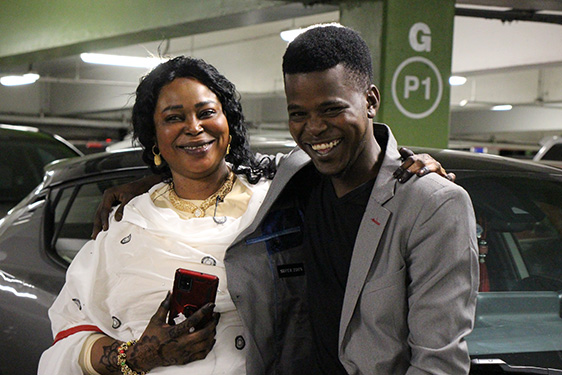
Samira and Omer, a mother and son, were violently separated while fleeing civil war in Sudan in 2016. After their separation, Samira was unsure where Omer was or whether he had survived. Omer was just 15 years old at the time.
Samira was resettled to Canada as a refugee, where she tried to begin a new life. But she was constantly thinking about Omer. “Here in Canada, my situation is very different from the past. I am very happy, and I thank the government of Canada that I am here. But at the same time, I have been missing part of my life: my children.”
A year after arriving in Canada, Samira discovered Omer was still alive after a friend recognized him in a photo Samira posted on Facebook, “I had two different feelings at the same time—joy and sadness. My joy was that—he is alive. But my sadness is knowing he is so far away from me,” Samira shared.
When Samira discovered this news, she applied for family reunification so Omer could join her in Canada. Family reunification is a rights-based legal pathway that allows refugees to be reunited with family members. At that time, Omer had been trafficked and was living in Chad in a dangerous situation. In Chad, a RefugePoint family reunification expert met with Omer and helped him with the steps needed to reunite with Samira. Unfortunately, the COVID-19 pandemic delayed this process.
Finally, after years of separation and countless video calls, Samira and Omer were reunited in Vancouver in May of 2023. Holding Omer tightly, Samira said: “Tonight is the first night I will sleep peacefully in Canada.”
Over 110 million people—about one in 74 of the world’s population—have been forced from their homes due to conflict. Many are separated from family and loved ones along the way. Family unity, a fundamental human right, should be accessible to refugees no matter where they come from or where their families are located. Yet without help, these reunions are often not possible. We need your help to ensure this right becomes a reality for more and more people.

Samira and Omer, a mother and son, were violently separated while fleeing civil war in Sudan in 2016. After their separation, Samira was unsure where Omer was or whether he had survived. Omer was just 15 years old at the time.
Samira was resettled to Canada as a refugee, where she tried to begin a new life. But she was constantly thinking about Omer. “Here in Canada, my situation is very different from the past. I am very happy, and I thank the government of Canada that I am here. But at the same time, I have been missing part of my life: my children.”
A year after arriving in Canada, Samira discovered Omer was still alive after a friend recognized him in a photo Samira posted on Facebook, “I had two different feelings at the same time—joy and sadness. My joy was that—he is alive. But my sadness is knowing he is so far away from me,” Samira shared.
When Samira discovered this news, she applied for family reunification so Omer could join her in Canada. Family reunification is a rights-based legal pathway that allows refugees to be reunited with family members. At that time, Omer had been trafficked and was living in Chad in a dangerous situation. In Chad, a RefugePoint family reunification expert met with Omer and helped him with the steps needed to reunite with Samira. Unfortunately, the COVID-19 pandemic delayed this process.
Finally, after years of separation and countless video calls, Samira and Omer were reunited in Vancouver in May of 2023. Holding Omer tightly, Samira said: “Tonight is the first night I will sleep peacefully in Canada.”
Over 110 million people—about one in 74 of the world’s population—have been forced from their homes due to conflict. Many are separated from family and loved ones along the way. Family unity, a fundamental human right, should be accessible to refugees no matter where they come from or where their families are located. Yet without help, these reunions are often not possible. We need your help to ensure this right becomes a reality for more and more people.
Alice*
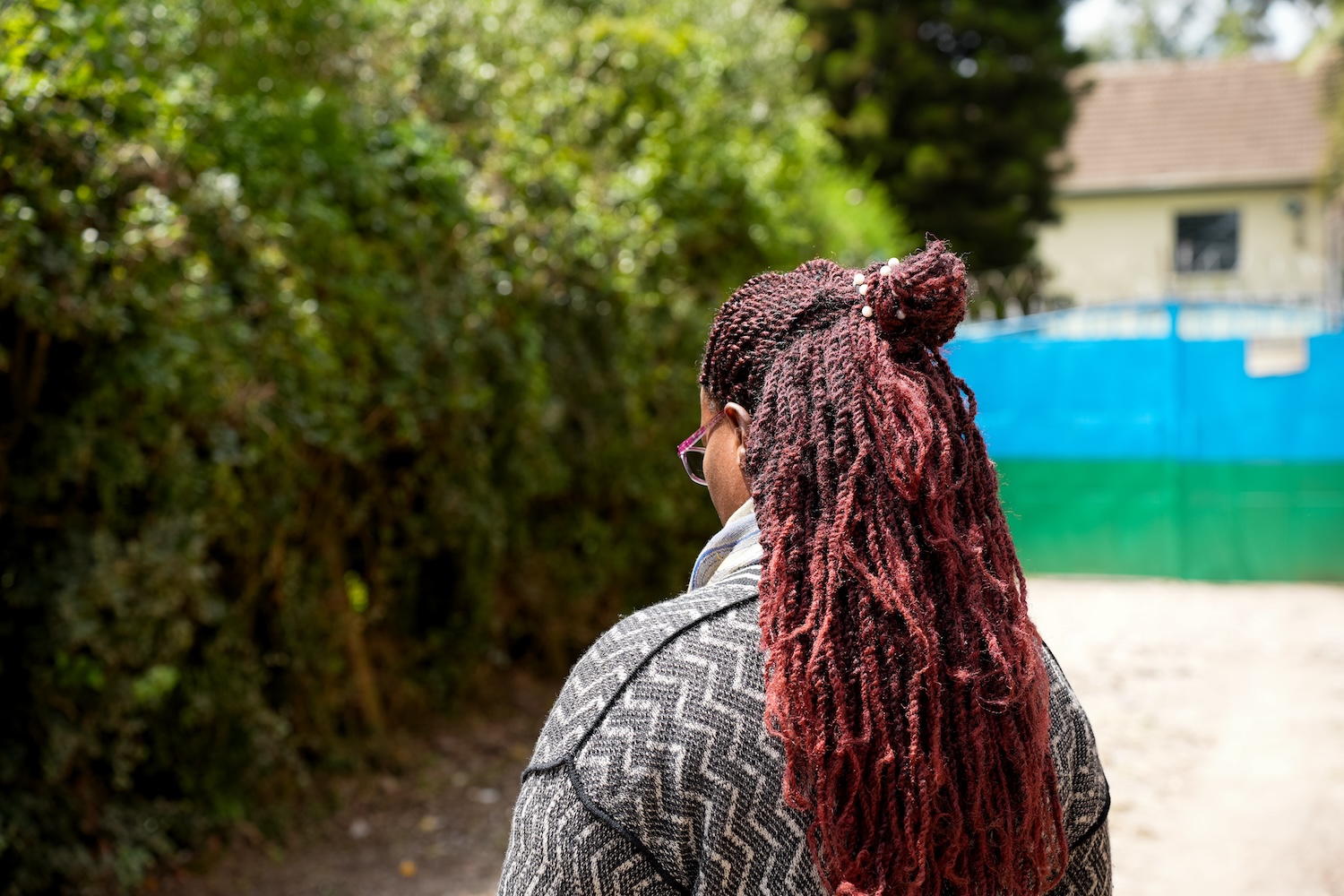
Imagine for a moment that you and your family are celebrating a loved one’s birthday, filled with joy and laughter. Then, suddenly, armed men intrude upon your gathering, threatening your lives, and changing everything in an instant. This is the harrowing reality Alice* and her sisters faced when the Mai-Mai rebel group disrupted their father’s birthday dinner at their home in the Democratic Republic of Congo.
“After they killed my dad and my sister, they took the remaining girls, four of us sisters… When they captured girls, they would take them to the mountains to perform unthinkable acts on them.”
Alice was held captive in the Mai-Mai mountain camp with her sisters for over two months. Finally, the women got an opportunity to escape and took it. “They chased us. We ran, falling down and kept running.” After escaping the camp, Alice and her two children fled from their home country, first to Uganda and then to Nairobi, Kenya, where they hid in the trunk of a car with luggage piled on top to conceal themselves.
However, their journey to safety didn’t end there. Even in Nairobi, Alice and her son faced ongoing violence and insecurity. Alice was attacked again. Since they could not live safely in the city, RefugePoint submitted the family’s case for resettlement. In 2022, Alice and her children were accepted for resettlement in Australia.
“My expectations when I get to Australia… I’ve always wanted to own a business. I’ll set up a business and I’ll be happy… You know I didn’t go to school, that’s why I want my son to get educated. I would like to see him become an engineer or a doctor. I would love to hear people saying, ‘Her son is a doctor, her son is an engineer.’ I will be very happy.”
Today, Alice and her son are awaiting his Australian visa, with hopes of being resettled soon.
*Name changed for protection purposes.

Imagine for a moment that you and your family are celebrating a loved one’s birthday, filled with joy and laughter. Then, suddenly, armed men intrude upon your gathering, threatening your lives, and changing everything in an instant. This is the harrowing reality Alice* and her sisters faced when the Mai-Mai rebel group disrupted their father’s birthday dinner at their home in the Democratic Republic of Congo.
“After they killed my dad and my sister, they took the remaining girls, four of us sisters… When they captured girls, they would take them to the mountains to perform unthinkable acts on them.”
Alice was held captive in the Mai-Mai mountain camp with her sisters for over two months. Finally, the women got an opportunity to escape and took it. “They chased us. We ran, falling down and kept running.” After escaping the camp, Alice and her two children fled from their home country, first to Uganda and then to Nairobi, Kenya, where they hid in the trunk of a car with luggage piled on top to conceal themselves.
However, their journey to safety didn’t end there. Even in Nairobi, Alice and her son faced ongoing violence and insecurity. Alice was attacked again. Since they could not live safely in the city, RefugePoint submitted the family’s case for resettlement. In 2022, Alice and her children were accepted for resettlement in Australia.
“My expectations when I get to Australia… I’ve always wanted to own a business. I’ll set up a business and I’ll be happy… You know I didn’t go to school, that’s why I want my son to get educated. I would like to see him become an engineer or a doctor. I would love to hear people saying, ‘Her son is a doctor, her son is an engineer.’ I will be very happy.”
Today, Alice and her son are awaiting his Australian visa, with hopes of being resettled soon.
*Name changed for protection purposes.
